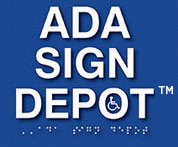What losing my hearing is teaching me about the suffering of others
ADA Sign Depot
July 23, 2016

Losing my hearing is teaching me about the suffering of others
{ Shop all Gender Neutral Bathroom Signs }
I came back from the beach one day to find my grandmother and her nearly deaf friend Hilda playing gin and drinking vodka. “She’s Not There,” by the Zombies, was playing on the radio.
This was a little strange.
“Why is Hilda listening to WFIL?” I asked.
“Shh,” my grandmother replied. “She thinks it’s classical.”
I’ve told this story lots of times since it happened, back in 1968. It always gets a laugh. But lately it doesn’t seem so funny.
Not long ago I was searing a steak in my apartment when the place filled with smoke and the fire alarm went off. I stood on a chair to try to turn it off. I had to do this about a half-dozen times before the thing stayed off, and each time I climbed up, my ears — already damaged from a lifetime of playing in rock ’n’ roll bands — were less than two feet from the piercing alarm.
When the noise finally stopped, my hearing was “traumatized,” as the otolaryngologist later described it. A high-pitched ringing began that night that has not ceased, a sound somewhere between the howling of wind and a chorus of crickets. I’ve also lost about 60 percent of the upper register of the sound spectrum, and what I do hear resembles the buzzing from a blown-out speaker.
I have been fitted with hearing aids. I am learning to read lips. Why yes, it does suck, thanks for asking.
Now I keep thinking about Hilda, whose handicap struck me more as the stuff of comedy than of compassion.
It wasn’t that I didn’t understand that she suffered, back when she was old and deaf and I was young and not. It’s that whatever she suffered from was something I didn’t need to be concerned with. It didn’t occur to me that imagining the humanity of people other than myself was my responsibility. And yet the root cause of so much grief is our failure to do just that.
Edmund Burke called this the “moral imagination,” the idea that our ethics should transcend our own personal experience and embrace the dignity of the human race.
In May, I appeared on the MSNBC show “Hardball With Chris Matthews” with a representative from the Family Research Council. The F.R.C. spokesman was asked by Mr. Matthews what bathroom I — a transgender woman — should use. Even though I “pass” as a woman and have female anatomy and ID, North Carolina law holds that I should use the men’s room (since my birth certificate says M).
My adversary was clearly uncomfortable with the idea of a woman like me in the men’s room; at the same time he did not want to budge from his talking point that people like me shouldn’t be allowed in the women’s room, either, because he was convinced that we constitute some sort of threat to children. In the end, he didn’t have an answer for the question, because the idea that I am human — and do occasionally need to use the restroom — was really not one that had given him much concern.
The delegates at the Republican convention recently brought this issue up once again. The party’s platform opposes gay adoption, marriage equality and, of course, trans people using the proper bathroom. Tony Perkins, president of the F.R.C., succeeded in adding language approving conversion therapy for L.G.B.T. children, which has long been discredited. Despite Donald Trump’s surprising vow, during his acceptance speech, to protect L.G.B.T. people from a “foreign ideology,” the overall tone of the convention was one of rejection.
This is not about marriage or bathrooms. It is about the fact that some Americans don’t like the idea that there are gay or trans people in the first place, and cannot imagine our lives. They seem to think we have come up with the entirety of our existence primarily in order to hurt other people’s feelings.
I have seen people open their hearts when some otherized soul is revealed to be a member of their own family, or a friend. Our culture is making progress as a result. But too many people are still met with hatred because whoever and whatever they are is something others have never been compelled to imagine.
In American Sign Language, the sign for “transgender” used to be the sign for “sex” — a curved finger drawn down across the cheek — which was then rotated 180 degrees, to suggest a “reversal of sex.” In more recent years, a new sign has been created: the fingers of the hand, facing downward over the heart like a closed flower, then rotating upward with opening petals until the fingers are then placed back over the heart with the “flower” facing in the right direction.
This is a sign I didn’t used to know, because I didn’t have to. I know it now.
Of course, sometimes difference is as much a challenge for our loved ones as for ourselves. After I left the otolaryngologist’s office with my diagnosis I called my wife on the phone. Mid-call, my throat closed up and I began to weep. “I’m sorry you have to be married to someone like me,” I sobbed.
It was a beautiful morning in New York. I was surrounded by honking taxis, singing birds, shouting children.
“What?” I said.
- Tags: Restroom Bathroom ADA Signs Subscribe to this blog's RSS feed.


